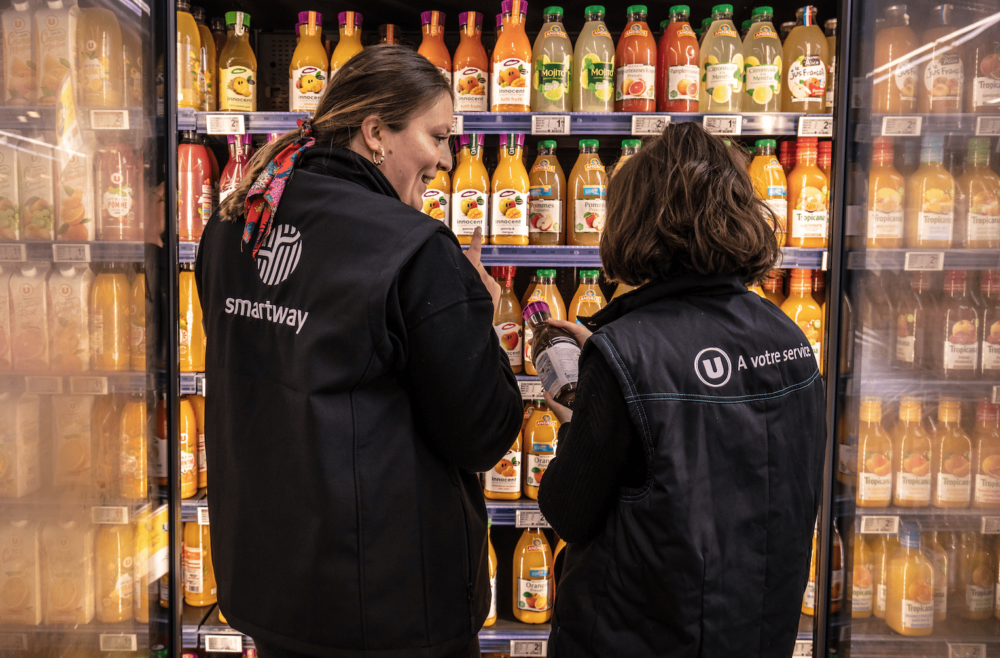Food waste technologies continue to attract investors due in large part to the sheer magnitude of the problem. In 2020 in the US alone, over 36 billion kilograms of food was discarded, amounting to 40% of the country’s food supply.
Over in France, Smartway is offering retailers an AI-powered solution to get control of food waste while also improving profitability.
The Nantes-based startup today announced the close of a €10 million ($11.8 million) funding round led by Supernova Invest. Evolem Start, Holnest, IDIA Capital Investissement, and UNEXO — part of financial services group Crédit Agricole — also took part in the round.
Launched in 2014, Smartway – earlier known as Zéro-Gâchis – aims to help supermarkets handle food waste more effectively through four features.
The first of these is Smartdetection, which helps stores identify which products are nearing their expiration date. Smartdecision then decides whether the expiring item should be discounted or donated.
“It prescribes the best output for every product regarding margins, weather forecasting, and all the data that we have. Let’s say you have 10 yogurts: It may tell you to mark seven of them at 30% off, and donate the rest to charities,” Smartway founder and CEO Paul-Adrien Menez told AFN.
Then, Smartdiscount steps in to print out a discount label where required, while Smartdonation navigates the administrative procedures around donating expired or near-expired items.
Through these offerings, Smartway claims it can reduce food waste by 80% while growing each store’s net profits by as much as 51%. Overall, it reports saving around $177 million for consumers through discounts, and preventing 56,846 tons of waste.
It says that over 400 shops across France are already using its technology.
Smartway will deploy the new funding to ramp up R&D efforts and enhance its tech. Its’ also hoping to fit out 4,000 supermarkets across France, Belgium, Portugal, and Spain by 2025, while accelerating its expansion into Italy and Eastern European markets.
Menez said that the startup is also in talks with a “major” supermarket chain in the US, but wants to focus on Europe in the first instance.
Retailers have been eager to learn about Smartway’s offering, he said. Given how razor-thin grocery margins are for them, any chance to recapture potential lost profits while improving their sustainability credentials is worth considering.
“When you look at the P&Ls of a food retailer, they waste as much as they earn every year. When we started nine years ago, food waste wasn’t really in the air and there was not so much awareness around it,” Menez said. “But today is totally different. It is moving in the right direction.”
Nevertheless, Smartway has had its fair share of challenges along the way. It learned it would have to adapt its system for each supermarket; the tech is now store-agnostic, according to Menez.
Competition is also stiff, with a growing number of startups trying to grab a piece of the food waste pie. Menez sees an advantage for Smartway in its relatively long six-year history, which has allowed it to build up a large data set and hone its AI.
“[Some] food waste startups are really HR-intensive companies that tend to hire customer success managers [who] will only manage 10 stores. That’s not scalable,” Menez argued.
“The other side is taking a niche approach, which is less profitable. Typically, we can work with anyone and help them to do better with our technology.”
Romain Sautrau, investment manager at Supernova Invest, told AFN that his team has evaluated a range of startups addressing food waste.
“The fact that Smartway has developed this breakthrough AI to tackle this global challenge was a really key differentiator for us,” he said.





